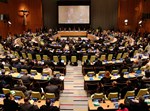Social Watch E-Newsletter - Issue 265 - July 15, 2016
Published on Fri, 2016-07-15 17:54
 |
| Issue 265 - July 15, 2016 |
|
| |
| |
Independent monitoring and review of the 2030 Agenda and the identification of structural obstacles are key factors for the success of the Sustainable Development Goals, argued Roberto Bissio, coordinator of Social Watch, at the launch of the 2016 Spotlight Report at the United Nations.
The Spotlight report 2016 is published by the Reflection Group on Sustainable Development, an alliance of Social Watch, Third World Network, ANND and DAWN. The report includes contributions on each of the Sustainable Development Goals (SDGs) by civil society networks and experts and national reports from forty countries.
Areli Sandoval, from Equipo Pueblo (Mexico), Juerg Staudenmann from Alliance Sud (Switzerland), Mahinour El Badrawi, from the Egyptian Center for Economic and Social Rights and Maria Victoria Raquiza, from Social Watch Philippines presented the conclusions from their national reports. Read more
|
|
| |
|
| |
|
| |
“Leave no one behind” has become a central rallying cry around the UN’s Sustainable Development Goals, but more needs to be done for it to be put into practice, said civil society during a review conference of progress made on the Post-2030 agenda.
The state of the Sustainable Development Goals in many countries can be described by the Spotlight Report as one of growing prosperity of the higher classes, but worsening multidimensional poverty, quality of life, and public safety, says the report.
“Financing conversations seem to be going back to business as usual. If some of what's on the table goes through, it will create direct obstacles to achieving the SDGs.” -- Barbara Adams. Read more
|
|
| |
|
| |
|
| |
 |
Can the 2030 Agenda be achieved without a global approach to taxes? Can it be assessed without promoting human rights and addressing the responsibilities of the rich and powerful? Can it be reviewed without looking at climate change, illicit financial flows, conflicts, and trade and investment agreements? Can it be measured with a single number? with 300 of them? or we need a new kind of dashboard to monitor sustainability? These and other questions have been tackled by a global alliance of civil society organizations and networks in their first “Spotlight Report”. The report will be launched on July 19 in Nairobi, during the fourteenth session of the UNCTAD, to take place in Nairobi, Kenya. The Spotlight report reviews obstacles to the fulfilment of the 17 goals, with inputs from civil society reports from around the world, focusing on inequalities, means of implementation and systemic issues. It is published by Social Watch, Third World Network, DAWN, ANND and Global Policy Forum, with support from the Friedrich Ebert Stiftung and contributions from a dozen of civil society international networks. Read here the information of the event |
|
| |
|
| |
|
| |
Czech Rep: Ups and downs in implementing the 2030 Agenda
|
| |
|
| |
The Czech Social Watch report launched last week in Prague recognizes achievements by its government in social policies, but also criticizes lack of progress in environmental issues. The Czech Republic supports peace and the Sustainable Development Goals, but on the other hand it stimulates arm exports and blocks developing country participation in international fora on tax havens and illicit financial flows. Although the Government generally supports the SGDs and the engagement of non-state actors in the planning process, some governmental departments fail, or in some cases, even refuse to take seriously the 2030 Agenda for Sustainable Development. Read more
|
| |
|
| |
|
| |
South Korea: SDGs win elections
|
| |
|
| |
South Korean society is currently experiencing rising economic inequality, against which Government policy has done nothing to stop. The current regime and the ruling party are distancing themselves from the implementation of the SDGs that relate to economic inequality and democracy. Instead, new laws make it easy for chaebol (mega corporations) to accumulate wealth, while weakening fundamental consumer rights and protections and the new Anti-terrorism Act, adopted in March 2016 includes provisions threatening democracy. Before the legislative election on 13 April 2016, SDG-related policies were included in the manifestos of all three opposition parties. Collectively these parties won more seats than the ruling party, which means that national level implementation of the SDGs might be on the parliamentary agenda in the near future. Read more
|
| |
|
| |
|
| |

UN Secretary General Ban Ki-Moon
addresses a session of the HLPF.
Photo: UN
|
As the High-Level Political Forum (HLPF) convenes this week to review implementation of the Sustainable Development Goals (SDGs), CESR's Kate Donald and Lena Kahler examine whether the new agenda will live up to its promise of promoting accountability and “leaving no one behind”.
As the global follow up and review mechanism for the 2030 Agenda for Sustainable Development adopted at the UN nine months ago, the HLPF is where world leaders will take stock of countries' SDG performance and address challenges in implementation. Yet serious doubts remain as to whether it will deliver on its mandate to “provide political leadership, guidance and recommendations on the Agenda's implementation and follow-up” as well as ensure accountability for the goals. Read more
|
|
|
|
| |
|
SOCIAL WATCH IS AN INTERNATIONAL NGO WATCHDOG NETWORK MONITORING POVERTY ERADICATION AND GENDER EQUALITY Social Watch >>
Social Watch E-Newsletter For comments, sugestions, collaborations contact us at: socwatch@socialwatch.orgTo stop receiving this newsletter send a message with the subject "unsubscribe" to: socwatch@socialwatch.org |
|
|
|
SUSCRIBE TO OUR NEWSLETTER
Submit
|
